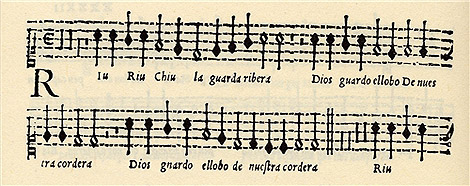HOME | FAMILY | CONDUCTING | SINGING | USU | STEINER | STANFORD | PHOTOS
STEINER 2013-2014 PROGRAMS | RECORDED AIDS | PRONUNCIATION AIDS
TRANSLATIONS AND TEXTS | COMPOSERS | STEINER MEMBERS WEB SITE
SOLOIST OPPORTUNITIES | TEXT/MUSIC CORRECTIONS
Steiner Chorale Members: If you would like to contact me,
please feel free to do so at
wmramsey@stanford.edu
I welcome your email/comments/questions, etc.
Texts and Translations
Britten - St. Nicolas Cantata Texts
St. Nicolas
Bishop of Myra
Patron-saint of children, seamen, and travellers
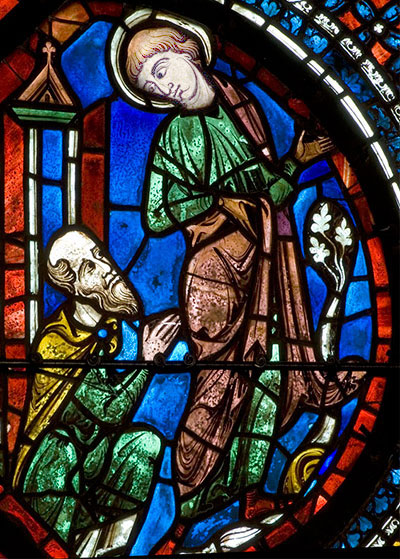
St. Nicolas - Chartres Cathedral - Bay 39
The Life and Miracles of Nicolas
The Old Man tries to thank Nicolas, who modestly flees from him
The entire stained glass depictions may be seen by clicking here
Nicolas was born in Patara in Asia Minor and died during the first half of the fourth century, having long served as Bishop of Myra, the capital of his native country, Lycia. He is the hero of many popular legends, but few facts of his life are certain.
In 1087 his relics were captured from his tomb at Myra and carried away to the Italian city of Bari, where a new church was built to enshrine them. Here they continued, as at Myra, to work miracles: the shrine, which is said to exude a miraculous, sweet-smelling oil, became a place of pilgrimage from all parts of Europe.
In the Middle Ages four hundred churches were dedicated to his honour in England alone. He is the parton-saint of Russia and Greece, and is universally known to children in his disguise of 'Santa Claus.'
Nicolas was born of wealthy parents. From his babyhood he showed signs of exceptional grace and refused to feed on canonical fast-days. He was taught by the Church in boyhood and youth, and when his parents died of the plague he gave all his wealth to charity and went in pilgrimage to the Holy Land. Coming back to the city of Myra, he was chosen Bishop according to a revelation made before his arrival, and served this diocese faithfully until his death.
During the persecution of the martyrs (303-311) Nicolas was imprisoned under Diocletian. Later he was one of the three hundred and eighteen Bishops summoned to attend the first great Church Council at Nicaea, where he is said to have disgraced himself, but gave great glory to God, by striking the founder of the Arian heresy.
Most legends of Nicolas are concerned with his care of the poor and oppressed, and with his power of appearing from great distances to rescue those who called on him. The three golden balls that he carries in statues and pictures symbolise the purses of gold he secretly gave to rescue three girls of noble family from prostitution.
Visit the St. Nicolas Center web site by clicking here.
The Saint Nicolas Cantata (note the name has no ‘H’ in it!) was written for the centenary of
Lancing College in Sussex, the independent secondary boarding school on the
south coast of England which Peter Pears had attended in his teens. It has a vast
chapel intended by its founder, Revd Nathaniel Woodard, as the cathedral for all
the schools of his extensive foundation known collectively as ‘Woodard’ schools.
St. Nicolas is famous for many legendary miracles and for being the original
‘Santa Claus’. Crozier’s libretto is designed to tell the story of his life, to recount
some of his most celebrated acts and to give the audience/congregation the
opportunity of joining in two beautiful hymns at key moments: ‘All people
that on earth do dwell’ and ‘God moves in a mysterious way his wonders to
perform’. The narration is all done by the choir, though the tenor sings firstperson narratives as well in his role as the mature Nicolas. The young Nicolas
is sung by a boy in movement II. There is a dramatic moment at the end of this
movement when the boy’s voice does a tumble and the tenor proclaims in the
voice of Nicolas as a young man: ‘God be glorified’.
The third movement is an accompanied recitative in which the soloist sings of Nicolas devoting himself to God through the agonies and torment of the many distractions and temptations of life. His faith wins through and he sings a final touching phrase: ‘and Love was satisfied’. The sea whips up a storm in the next movement: ‘He journeys to Palestine’. It threatens to overturn the ship and drown everyone on board. There is wailing from the sopranos and altos of the semi-chorus and agonised calls from the tenors and basses to ‘man the pumps’. Finally, Nicolas begs God to let the storm cease and offers thanks for their safe delivery. Britten creates a palpable sense of relief in the final pages.
In the fifth movement, ‘Nicolas comes to Myra and is chosen Bishop’, the choir sings chorale-like phrases welcoming him as their new Bishop. They go through his ceremonial dressing with all the accoutrements of his office, the mitre, crozier (nice pun on the librettist’s name), robe and ring. An energetic chorus ‘Serve the faith and spurn his enemies’ leads to the first great hymn – a wonderfully climactic moment. Britten’s arrangement is suitably uplifting.
But things did not go on smoothly and during the reign of Diocletian and the persecution of martyrs (303-311) Nicolas was imprisoned for eight years before he could resume his pastoral mission among the poor and disadvantaged. The sixth movement is an impassioned picture of those barren years and Nicolas’ frustration at the interruption of his work. In the next movement, probably the best-known section of the work, Nicolas performs the miracle of the three pickled boys lost to their families, ‘slaughtered by the butcher’s knife’. At the end of this movement three boys enter from the other end of the church singing ‘Alleluia’. It is a very moving moment. Continuing this theme, the eighth movement ‘His piety and marvellous works’ is a list of miracles he performed followed by a beautifully simple falling phrase which is sung like a round ‘Let the legends that we tell, Praise him with our prayers as well’. Typical Britten, tuneful, memorable and supremely effective. The final movement tells of Nicolas’ death and the work ends with the other great hymn: ‘God moves in a mysterious way’.
There are divided opinions about this work. Some feel it to be sentimental, while
others, like me, feel that it is a genuine and heartfelt response to a text which
is aimed at connecting with young people. Typical of Britten is the eminently
practical nature of the work. Its orchestration is minimal and the string parts are
written to be played by amateurs led, as Britten notes, preferably by a quintet of
professionals. He also notes that the piano duet part is not difficult and can also
be played by less experienced players. Only the first percussion part should be
taken by a professional. He should also play as many of the other instruments
as he can. The other parts can be played ad libitum by one or more ‘enthusiastic
amateurs’. This is Britten the social musician, the encourager and provider of
good new music for the young of all abilities. If some of the music is therefore
not what the classical music establishment thought the composer should be
spending his time on, we should focus instead on how young performer’s faces
light up as they get stuck into the task in hand and involved with the story. It
has all the right elements for our ‘Harry Potter’ age: magic (lots of miracles),
drama (storm at sea), imprisonment (will he, won’t he get out?), and even a
wand – of sorts – in his crozier!
Saint Nicolas is a great audience piece. It forms a meaty work for a half of a concert programme and it involves everybody. It can be produced inexpensively if the minimum of professionals are used: tenor solo, string quintet and percussionist. Even if all the orchestral forces are professional it will not break the bank – a serious consideration in these straitened times. Its greatest challenge is managing the forces and the distances. Britten suggests that the gallery choir (sopranos and altos) has its own conductor which helps. The work can also be sung by almost any fair-sized choir, and can be very effective with a large group.
This work demonstrates Britten’s generosity of spirit and his natural feeling for enriching the repertoire at all levels of attainment. What a gift!
Quoted from Britten Choral Guide by Paul Spicer.
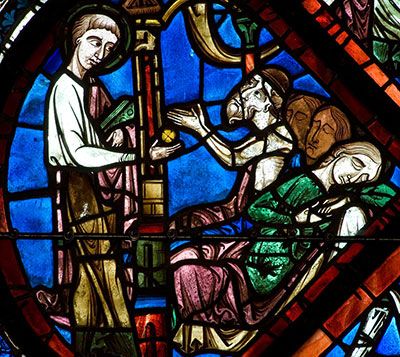
Nicolas secretly gives gold to an old man to save his daughters
Texts
1. Introduction
Chorus: Our eyes are blinded by the holiness you bear.
The bishop’s robe, the mitre and the cross of gold
Obscure the simple man within the Saint.
Strip off your glory, Nicolas, and speak!
Nicolas: Across the tremendous bridge of sixteen hundred years
I come to stand in worship with you
As I stood among my faithful congregation long ago.
All who knelt beside me then are gone.
Their name is dust, their tombs are grass and clay,
Yet still their shining seed of faith survives
In you!
It weathers time, it springs again
In you!
With you it stands like forest oak
Or withers with the grasses underfoot.
Preserve the living Faith for which your fathers fought!
For Faith was won by centuries of sacrifice
And many martyrs died
That you might worship God.
Chorus: Help us, Lord! to find the hidden road
That leads from love to greater Love, from faith
To greater Faith.
Strengthen us, O Lord!
Screw up our strength to serve Thee with simplicity.
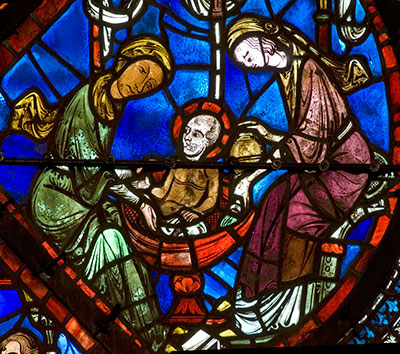
Nativity of St. Nicolas; the miracle of his first bath
2. The Birth of Nicolas
Chorus: Nicolas was born in answer to prayer,
And leaping from his mother’s womb he cried
Nicolas: God be glorified!
Chorus: Swaddling-bands and crib awaited him there,
But Nicolas clapped both his hands and cried
Nicolas: God be glorified!
Chorus: Innocent and joyful, naked and fair,
He came in pride on earth to abide.
Nicolas: God be glorified!
Chorus: Water rippled Welcome! in the bath-tub by his side;
He dived in open-eyed, he swam, he cried
Nicolas: God be glorified!
Chorus: When he went to Church at Christmastide,
He climbed up to the font to be baptised.
Nicolas: God be glorified!
Chorus: Pilgrims came to kneel and pray by his side.
He grew in grace, his name was sanctified.
Nicolas: God be glorified!
Chorus: Nicolas grew in innocence and pride,
His glory spread a rainbow round the countryside,
‘Nicolas will be a Saint!’ the neighbours cried.
Nicolas: God be glorified!
3. Nicolas Devotes Himself to God
Nicolas: My parents died
All too soon I left the tranquil beauty of their home
And knew the wider world of man.
Poor man! I found him solitary, racked
By doubt: born, bred, doomed to die
In everlasting fear of everlasting death:
The foolish toy of time, the darling of decay—
Hopeless, faithless, defying God.
Heartsick, in hope to mask the twisted face of poverty,
I sold my lands to feed the poor.
I gave my goods to charity
But Love demanded more.
Heartsick, I cast away all things that could distract my mind
From full devotion to His will;
I thrust my happiness behind
But Love desired more still.
Heartsick, I call’d on God to purge my angry soul,
To be my only Master, friend and guide.
I begged for sweet humility
And Love was satisfied.
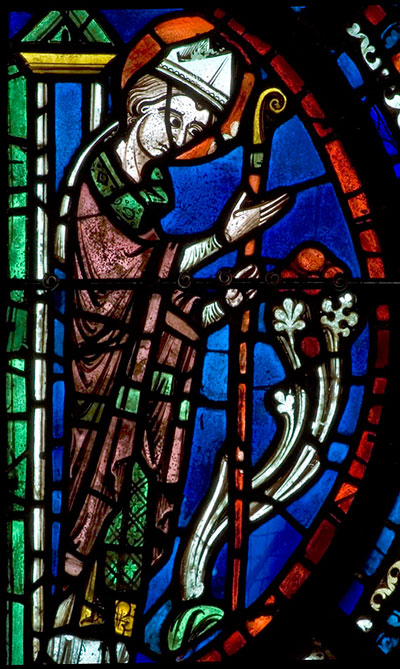
During a famine, Nicolas persuades sailors to give the town some grain
4. He Journeys to Palestine
Chorus: Nicolas sailed for Palestine
Across the sunlit seas.
The South West Wind blew soft and fair,
Seagulls hovered through the air,
And spices scented the breeze.
Everyone felt that land was near:
All dangers now were past:
Except for one who knelt in prayer,
Fingers clasped and head quite bare,
Alone by the mizzen mast.
The sailors jeered at Nicolas,
Who paid them no regard,
Until the hour of sunset came
When up he stood and stopped their game
Of staking coins on cards.
Nicolas spoke and prophesied
A tempest far ahead.
The sailors scorned such words of fear,
Since sky and stars shone bright and clear,
So ‘Nonsense!’ they all said.
Darkness was soon on top of them,
But still the South Wind blew.
The Captain went below to sleep,
And left the helmsman there to keep
His course with one of the crew.
Nicolas swore he’d punish them
For mocking at the Lord.
The wind arose, the thunder roared,
Lightning split the waves that poured
In wild cascades on board.
Waterspouts rose in majesty
Until the ship was tossed
Abaft, aback, astern, abeam,
Lit by lightning’s livid gleam,
And all aboard cried ‘Lost!’
Lightning hisses through the night,
Blinding sight with living light!
Ah! Spare us! Man the pumps! Save us!
Man the pumps! Axes! Saviour! Ah!
Winds and tempests howl their cry
Of battle through the raging sky!
Ah! Spare us! Lifeboats! Save us!
Lifeboats! Lower away! Saviour!
Waves repeat their angry roar,
Fall and spring again once more!
Let her run before the wind!
Shorten sail! Reef her! Heave her to!
Thunder rends the sky asunder
With its savage shouts of wonder! Ah!
Pray to God! Kneel and pray!
Lightning, Thunder, Tempest, Ocean
Praise their God with voice and motion.
Nicolas waited patiently,
Till they were on their knees,
Then down he knelt in thankfulness
Begging God their ship to bless
And make the storm to cease.
Nicolas: O God! we are all weak, sinful, foolish men.
We pray from fear and from necessity at death, in sickness or private loss.
Without the prick of fear our conscience sleeps, forgetful of Thy Grace.
Help us, O God! to see more clearly.
Tame our stubborn hearts.
Teach us to ask for less and offer more in gratitude to Thee.
Pity our simplicity, for we are truly pitiable in Thy sight. Amen.
The winds and waves lay down to rest,
The sky was clear and calm.
The ship sailed onward without harm
And all creation sang a psalm
Of loving thankfulness.
Beneath the stars the sailors slept
Exhausted by their fear, while I
Knelt down for love of God on high
And saw His angels in the sky
Smile down at me,
And wept, wept, and wept.
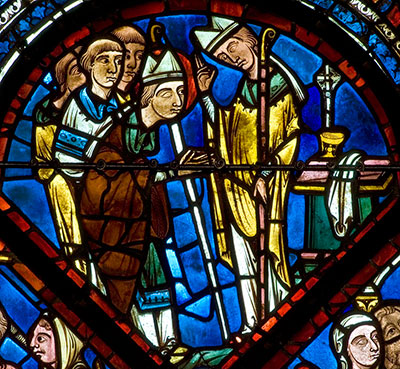
The installation of Nicolas as Bishop of Myra
5. Nicolas Comes to Myra and is Chosen Bishop
Chorus: Come, stranger sent from God!
Come, man of God!
Stand foremost in our Church, and serve this diocese,
As Bishop Nicolas, our shield, our strength, our peace!
Nicolas: I Nicolas, Bishop of Myra and its diocese,
Shall with the unfailing grace of God,
Defend His faithful servants,
Comfort the widow and fatherless,
And fulfil His will for this most blessed Church.
Chorus: Amen. Place the mitre on your head to show your mastery of men!
Take the golden robe that covers you with Christ’s authority!
Wear the fine dalmatic woven with the Cross of Faith.
Bear the crozier as a staff and comfort to your flock!
Set the ring upon your hand in sacramental sign of wedlock with thy God!
Serve the Faith and spurn His enemies!
Congregation: All people that on earth do dwell,
Sing to the Lord with cheerful voice!
Him serve with fear, His praise forth tell,
Come ye before Him and rejoice.
O enter then His gates with praise,
Approach with joy His courts unto,
Praise, laud and bless His name always,
For it is seemly so to do.
For why? the Lord our God is good:
His mercy is for ever sure;
His truth at all times firmly stood,
And shall from age to age endure. Amen.
6. Nicolas From Prison
Nicolas: Persecution sprang upon our Church
And stilled its voice.
Eight barren years it stifled under Roman rule:
And I lay bound, condemned to celebrate
My lonely sacrament with prison bread,
While wolves ran loose among my flock.
O man! the world is set for you as for a king!
Paradise is yours in loveliness.
The stars shine down for you, for you the angels sing,
Yet you prefer your wilderness.
You hug the rack of self,
Embrace the lash of sin,
Pour your treasures out to bribe distress.
You build your temples fair without and foul within:
You cultivate your wilderness.
Yet Christ is yours. Yours!
For you He lived and died.
God in mercy gave His son to bless you all,
To bring you life,
And Him you crucified
To desecrate your wilderness.
Turn away from sin! Ah! bow
Down your hard and stubborn hearts!
Confess, yourselves to Him in penitence
And humbly vow your lives to Him, to holiness.
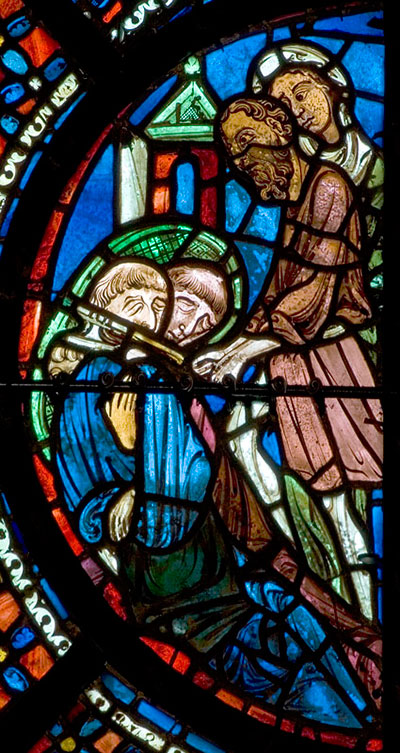
The Innkeeper murders the three students in their sleep
7. Nicolas and the Pickled Boys
Chorus: Famine tracks us down the lanes,
Hunger holds our horses’ reins,
Winter heaps the roads with snow;
O we have far to go!
Starving beggars howl their cry,
Snarl to see us spurring by,
Times are bad and travel slow;
O we have far to go!
We mourn our boys, our missing sons!
We sorrow for three little ones!
Timothy, Mark and John are gone!
Landlord, take this piece of gold!
Bring us food before the cold
Makes our pangs of hunger grow;
O we have far to go!
Day by day we seek to find
Some trace of them, but oh! Unkind!
Timothy, Mark and John are gone!
Let us share this dish of meat.
Come, my friends, sit down and eat!
Join us, Bishop, for we know
That you have far to go!
Mary meek and Mother mild
Who lost thy Jesus as a child,
Our Timothy, Mark and John are gone!
Come, your Grace, don’t eat so slow!
Take some meat …
Nicolas: O do not taste! O do not feed on sin!
But haste to save three souls in need!
The mothers’ cry is sad and weak,
Within these walls they lie
Whom mothers sadly seek …
Timothy, Mark and John,
Put your fleshly garments on!
Come from dark oblivion! Come!
Chorus: See! Three boys spring back to life,
Who, slaughtered by the butcher’s knife,
Lay salted down!
And entering, hand in hand they stand and sing
Alleluia to their King!
8. His Piety and Marvellous Works
Chorus: For forty years our Nicolas,
Our Prince of men, our shepherd and
Our gentle guide, walked by our side.
We turned to him at birth and death,
In time of famine and distress,
In all our grief, to bring relief.
He led us from the valleys to
The pleasant hills of grace, he fought
To fold us in from mortal sin.
O! he was prodigal of love!
A spendthrift in devotion to
Us all and blessed as he caressed.
We keep his memory alive
In legends that our children and
Their children’s children treasure still.
A captive at the heathen court
Wept sorely all alone.
‘O Nicolas is here, my son!
And he will bring you home!’
‘Fill, fill my sack with corn!’ he said:
‘We die from lack of food!’
And from that single sack he fed
A hungry multitude.
Three daughters of a nobleman
Were doomed to shameful sin,
Till our good Bishop ransomed them
By throwing purses in.
The gates were barred, the black flag flew,
Three men knelt by the block,
But Nicolas burst in like flame
And stayed the axe’s shock.
‘O help us, good Nicolas!
Our ship is full of foam!’
He walked across the waves to them
And led them safely home.
He sat among the Bishops who
Were summoned to Nicaea:
Then rising with the wrath of God
Boxed Arius’s ear!
He threatened Constantine the Great
With bell and book and ban:
Till Constantine confessed his sins
Like any common man.
Let the legends that we tell,
Praise him, with our prayers as well.
We keep his memory alive
In legends that our children and
Their children’s children treasure still.
9. The Death of Nicolas
Nicolas: Death, I hear thy summons and I come
In haste, for my short life is done;
And O! my soul is faint with love,
For Him who waits for me above.
Lord I come to life, to final birth
I leave the misery of earth,
For light, by Thy eternal grace,
Where I shall greet Thee face to face.
Christ, receive my soul with tenderness,
For in my last of life I bless Thy name,
Who lived and died for me,
And dying, yield my soul to Thee.
Chorus: Lord, now lettest Thou Thy servant
Depart in peace, according to Thy word.
For mine eyes have seen Thy salvation
Which Thou hast prepared before the face of all people
To be a light to lighten the Gentiles
And to be the glory of Thy people Israel.
Glory be to the Father, and to the Son,
And to the Holy Ghost.
As it was in the beginning, is now and ever shall be
World without end. Amen!
Congregation: God moves in a mysterious way
His wonders to perform;
He plants His footsteps in the sea,
And rides upon the storm.
Deep in unfathomable mines
Of never failing skill
He treasures up His bright designs,
And works his sovereign will.
Ye fearful saints, fresh courage take,
The clouds ye so much dread
Are big with mercy, and shall break
In blessings on your head. Amen.
Eric Crozier (1914-1994)
Riu, riu, chiu
Riu riu chiu, la guarda ribera;
Dios guardo el lobo de nuestra cordera,
Dios guardo el lobo de neustra cordera.Riu, riu, chiu (Nightingale sounds)
The river bank protects it,
As God kept the wolf from our lamb.1.
El lobo rabioso la quiso morder,
Mas Dios poderoso la supo defender;
Quisola hazer que no pudiese pecar,
Ni aun original esta Virgen no tuviera.1.
The rabid wolf tried to bite her,
But God Almighty knew how to defend her;
He wished to create her impervious to sin,
Nor was this maid to embody original sin.2.
Este qu'es nacido es el gran monarca,
Christo patriarca, de carne vestido;
hanos redimido con se hacer chiquito,
a un qu'era infinito, finito se hiziera.2 .
The newborn child is the mightiest monarch,
Christ patriarchal invested with flesh.
He made himself small and so redeemed us:
He who was infinite became finite.3.
Muchas profecias lo han profetizado,
Ya un nuestros dias lo hemos al consado
Adios humanado vemos en el suelo,
Yal hombre nelcielo porquel le quistera.3.
Many prophecies told of his coming,
And now in our days have we seen them fulfilled.
God became man, on earth we behold him,
And see man in heaven because he so willed.4.
Yo vi mil garzones que andaban cantando,
por aquí volando, haciendo mil sones,
diciendo a gascones: "Gloria sea en el cielo
y paz en el suelo", pues de sus nasciera.4.
A thousand singing angels I saw passing,
Flying overhead, sounding a thousand voices,
Exulting, "Glory be in the heavens,
And peace on Earth, for Jesus has been born."
Lulay My Liking
Refrain
Lullay, myn lykyng, my dere sone, myn swetyng,
Lullay, my dere herte, myn owyn dere derlyng.I saw a fayr maydyn syttyn and synge,
Sche lullyd a lytyl chyld, a swete lordyng,
RefrainThat eche lord is that that made alle thinge,
Of alle lordis he is lord, of alle kynges kyng.
RefrainTher was mekyl melody at that chyldes berthe,
Alle tho wern in hevene blys thei made mekyl merthe,
RefrainAungelebryt thei song that nyt and seydyn to that chyld,
"Blyssid be thou, and so be sche that is bothe mek and myld".
RefrainPrey we now to that chyld, and to his moder dere,
Grawnt hem his blyssyng that now makyn chere.
Refrain

